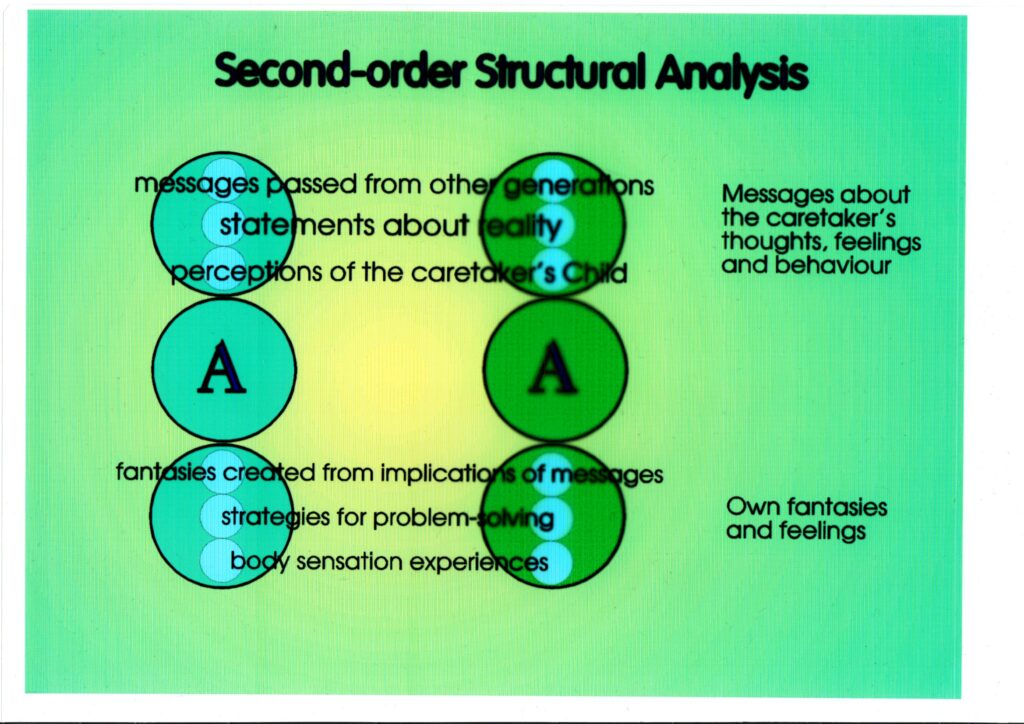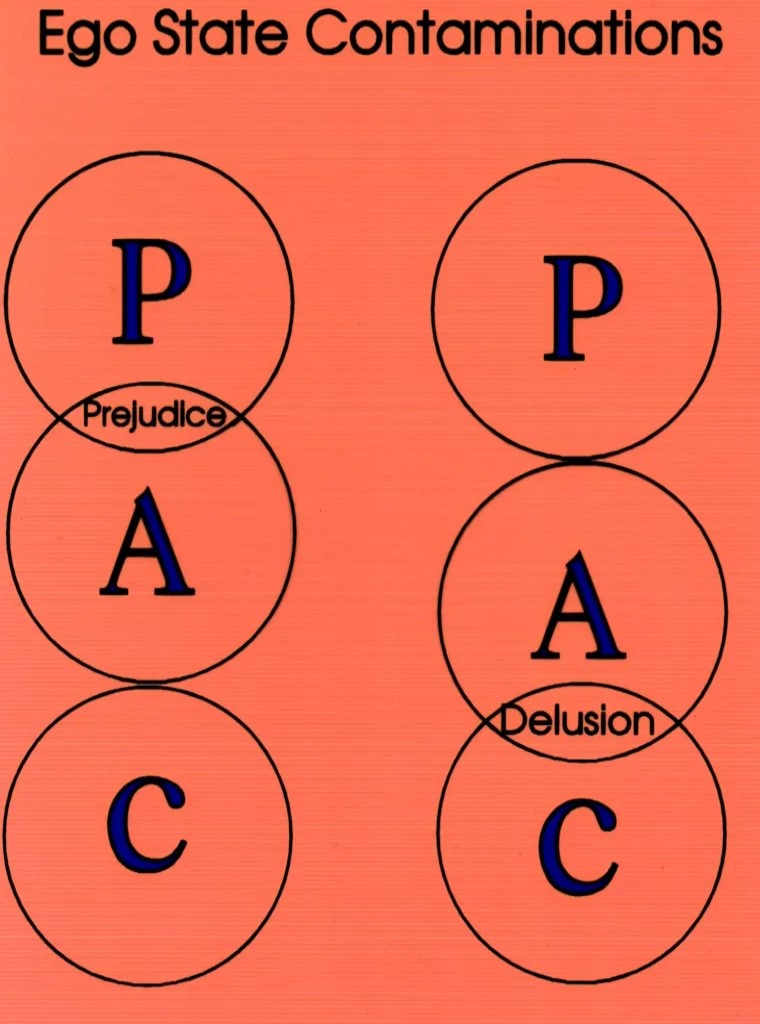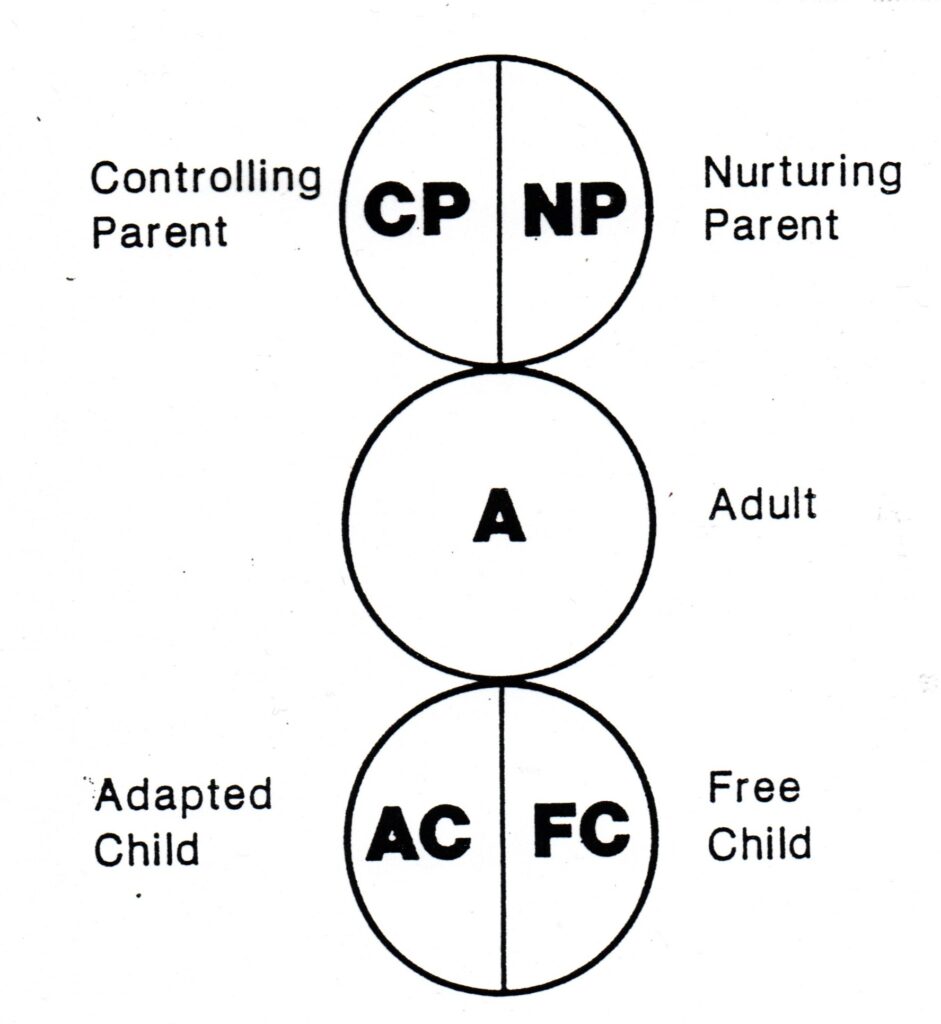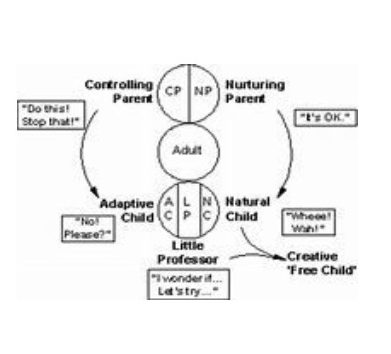Here’s a tricky diagram to get this page started! It may make more sense as you read on.
Therapy is often taken up with the quality of talk between our own ‘parts’; our internal dialogue. This theme re-appears a few times on this website.
On this page, I mention Transactional Analysis (TA) as a model with much to say about our internal conversation and its impact on our external conversation.
Here’s a quick revisit of the fundamental TA model, and its ego states:

In this model, Adult processes NOW and seeks to keep me grounded by maintaining executive control over other Ego States.
Quite often it does not succeed! Hence:

…. I have prejudices about the world in which I live when the boundaries between my Parent and Adult Ego States overlap.
I suffer delusions about who I am when my Adult overlaps with the Child Ego State. In both cases, I need to pay careful attention to my boundaries – within myself, and between myself and others in my world.
The TA term for these overlaps is Contamination. Contamination of different parts of our personality means that two ego states overlap or distort one another. It is difficult for me to keep the different ego states separate from each other.
I have discussed one result when these overlaps occur – the impasse and looping – a time when I feel stuck.
There is a different distortion, arising from Exclusions. This happens when the Ego States no longer just touch. They are separated and disconnected. This can so sufficiently disruptive to promote dissociative states with us.
On this page I now move the focus from the Structure of ego states, on to the Function of Ego States.
I shall focus on the impact of our Controlling or Critical Parent (CP) on our relationships with other. Please keep in mind that any Contamination or Exclusion will promote arguments between our ‘parts’.
Here is my own ‘map’ of Structural features of the Ego States

Critical Parent can create those defeats that bring us into therapy.
The Parent Ego State
As Bob Cooke from Manchester tells us: the parent ego state contains the attitudes and behaviours that are observed and copied from our caretakers and authority figures. The copying includes both spoken and unspoken rules; the “shoulds’ and the ‘oughts” of life.
As I like rude words, I use the term ‘mustabation’ as a label for this!
Now here’s a safe experiment: what are your ‘rules’ about the world and how you should behave within it?
Here’s some more safe experiments taken from:
1. Find ways to relate differently to Projection and Loneliness
https://confidentman.net/self-esteem/recover-critical-parent advises that our caretakers, when critical of us, can damage our self-confidence well into adulthood. Past hurt can be carried as permanent wounds. The pain that arises from them – can manifest in repetitive behaviour – in an apparent stuckness and looping actions.
My page on the defence mechanisms describe some of the many ways any hurt may appear as vicious cycle of projection and disconnection. Some of us will hide that wound, and others are inclined to let all and sundry know about it.
You may find that friends who have experienced trauma, or longer-term neglect ,will avoid some of the feelings they experience. It will not help to push it into their face, but you can acknowledge other peoples’ pain – not with the TV scriptwriter’s favourite – ‘sorry to hear about your loss‘ – but with a more compassionate and provisional ‘sounds like that was a bad time’ [or the like].
What’s the difference? That second response invites a response, and an opportunity to talk; the first ritual comment invites an acknowledgement only (at best).
Any response that invites further comment, without demanding it, can be heard as supportive.
Furthermore, we can pay attention to our own behaviour. In general, when I criticise and judge others, I am often projecting on to others some unacceptable or unacknowledged part of myself. That awareness may help me be more careful; to be rather more compassionate towards myself, not to mention other people.
Critical people often possess a fierce internal critic – aiming barbs right back at themselves.
2. Understand that criticism is rarely about me
Again, https://confidentman.net/self-esteem/recover-critical-parent reminds us that our care-taker’s criticism often came down to some unhealed wound of their own. When your behaviour reminded them of that unhealed pain, it was easier for them to criticise you and get you to stop offering up some reminder of an unhappy time, now past.
3. Allow yourself to get angry
…. as an antidote to the shame induced by being around Critical Parent. Anger can help release the repression of ourselves we learned over the years.
https://confidentman.net/self-esteem/recover-critical-parent says “Yet I now realize that the problem wasn’t that my parents got angry: the problem was their attempts to deny their anger, and the resulting destructive way they ended up expressing it”. He points out that being angry with a caretaker is frightening for a child. Alienating that person by expressing any strong, negative feeling can lead to abandonment. That’s tricky when we depend on them for our survival.
This is a personal experience well worth listening to, especially if you can use the ‘editing’ safe experiment (described at the bottom of that page) – to moderate the catastrophising and mustabation contained in the many ‘always’ and ‘nevers’.
That way, some compassion can be retained for ourselves and our carers. Also, it minimises any competition between youself and those who reared you.
Learn To Express Your Feelings
Shutting down your expression of feeling is the first step towards taking a narrow scenic route. Expressing our emotions freely allows us to look to life our eyes to the horizon as we walk along that route.
One way to express your true feelings is to be direct about them. Do not assume that other people know how you feel. Tell them in the first person, present tense.
Take Time Out If You Need It
Some caretakers cannot take assertive responses from others. It brings our Critical Parent in spades. Most often, then, we need to get away from ‘vexatious people’, as the Desiderata puts it. That is done by taking time out.
Talking to our own Critical Parent just a little bit differently
It’s tempting to reject our inner critic to reduce self-criticism. That is a recipe for creating anxiety and depression.
This is where the Internal Family Systems (IFS) perspective can be of some help. This model invites us to talk to our ‘exiles’ in a changed language and tone.
Internal Family Systems (IFS)
I will use this opportunity to comment on more modern representations of ‘parts’ work, as offered by Internal Family Systems (IFS).
For more detail, please visit: https://ifs-institute.com/resources/articles/internal-family-systems-model-outline.
I have been critical of the founders of this model for re-inventing the wheel without respecting their predecessors. On this page, however, their term ‘exile’ is a helpful one. The impact of the Critical Parent Ego State is to tempt us to ‘eject’ parts of ourselves from existence.
Critical Parent can become a ‘Manager’ and other ‘parts’ can become the ‘firefighters’ to use the terms from IFS. The Adult Ego State is not in the executive with contaminations and exclusions abounding.
In practice, what might be done to develop small, safe experiments using all these sources? What about:
- bringing Acceptance and Commitment Therapy (ACT), along with Compassion-focused Therapy (CFT), into the ‘language’ of Internal Family Systems (IFS)?
- and encouraging your own internal dialogue to focus on strengths of our different parts.
- and finding something just a little bit different to say to yourself, or to another person.
- and challenging ourselves to say what we mean, and mean what we say. To take responsibility for the boundaries we create with others.
- and participating in conversations that re-negotiate our boundaries with others.
- and identifying and respecting our defence systems differently.
